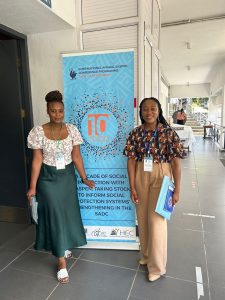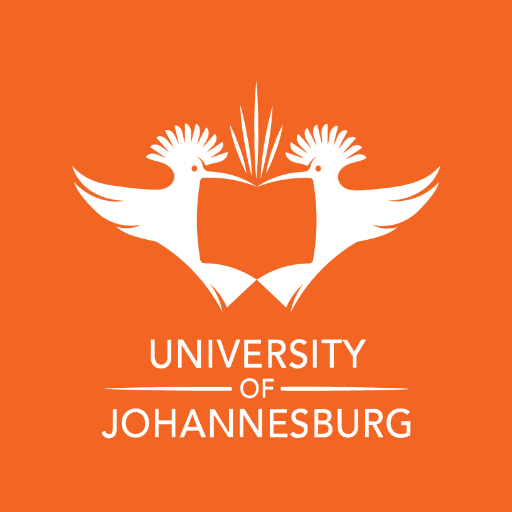The CSDA’s Khuliso Matidza and Senzelwe Mthembu present at the SASPEN Conference in Mauritius
The Southern African Social Protection Experts’ Network (SASPEN) in collaboration with the University of Mauritius and the Ministry of Social Integration, Social Security and National Solidarity and other cooperating partners, hosted the 2023 International Annual SASPEN Conference with delegates from Zambia, Zimbabwe, Malawi, Uganda, Ethiopia, Mauritius and South Africa just to mention a few. The theme was “A Decade of Social Protection with SASPEN: Taking Stock to Inform Social Protection Systems’ Strengthening in the SADC”.
Senzelwe presented her abstract titled, “Income Transfers and Local Economic Resilience during Times of Crisis in South Africa: The Social Relief of Distress Grant.” The abstract was selected under the sub-theme, Social Protection for Non-Standard Workers. The paper examined the role of income transfers in promoting local economic resilience during times of crisis in South Africa and found that that income transfers have played an important role in promoting local economic resilience in South Africa during the pandemic by supporting local consumption and helping businesses to survive and extending social protection to more people. Read the full article here.
Income transfers, such as social grants, have become a critical source of support for vulnerable households in times of economic and social shocks, such as the Covid-19 pandemic. However, their impact on local economic resilience is still not well understood. Using data from a qualitative study (The Local Economic Development Effects of Income Transfers in South Africa. The Social Relief of Distress Grant.) that considered the effects of the Social Relief of Distress (SRD) grant on local economies in five urban and peri-urban locations in South Africa, through the perspectives of informal traders, this study analyzes the relationship between income transfers and local economic resilience in South Africa during the pandemic.
The study finds that income transfers have played an important role in promoting local economic resilience in South Africa during the pandemic. Specifically, income transfers have supported local consumption, helped informal trader businesses survive (and in some cases new businesses could be initiated), played a redistributive role by extending a social protection mechanism to previously excluded constituencies including informal workers and unemployed youth and have provided critical support to vulnerable households and helped communities maintain local economic activity.
The paper also discusses the policy implications of these findings. It argues that income transfers can be an effective tool for promoting local economic resilience during times of crisis, but they need to be designed and implemented in a way that considers local economic conditions and the needs of different communities. Although the SRD could not reverse the negative impacts of Covid-19, and cannot be considered a standalone intervention, it did function as an effective shock-responsive mechanism for households and local economies. The detection of economic multipliers in a time of emergency, signals the potential for a long-term intervention that could be beneficial to local economies during times of crisis and beyond.
KEY FINDINGS:
- The SRD enabled businesses to survive by providing capital to purchase stock, especially for smaller, low-cost products like snacks.
- SRD was seen as seed money. Traders were able to save multiple monthly payments to buy a more substantial amount of stock and they also pooled their grants with others. Buying stock and investing the grant into their business was seen as a way of stretching small amounts of income. In some cases, the SRD enabled new businesses to be initiated.
- SRD supported the agency and livelihood management of informal traders. Managing an informal trade business involves very careful and sensitive decision-making about how to manage business and household needs on a daily basis.
- The SRD increased customer demand by permitting new customers (especially youth and the chronically unemployed) to participate economically.
- When consistent, the SRD provided a guarantee of income, enabling customers to buy on credit (bringing in a level of flexibility to the market); this trust was eroded when payouts were inconsistent.
- But there were challenges in consistency with increases in customers due to SRD but a much larger loss of customers due to Covid-19.
- In conclusion the SRD was able to stimulate the mobility of people, goods and money by broadly spanning customers and suppliers, transport, formal and informal business. The simultaneous intervention of the SRD at multiple points in the local economy was an important factor in achieving its protective and promotive function and activating local economies, thereby keeping local economies moving.
Khuliso presented her abstract titled: Youth and the future of work: rethinking social protection and social contracts in the context of the gig economy.
Her paper examines high rates of unemployment in many African countries, including South Africa, which has resulted in a rise in temporary or part time digital employment, or the gig economy. This is because digital technologies offer new opportunities, particularly appealing for youth. However, the rise of gig work challenges conventional ideas about how and where work is undertaken while also blurring the distinction between being an employee and/or self-employed. Without social protection and/or a commitment on the part of employers to a social contract, growing numbers of gig workers will be vulnerable to contingencies along the life-course. There is currently no consensus in South Africa on how new forms of digital work should be classified and what forms of protection to afford gig workers. It is thus critical to understand these shifts and to develop forward-looking policies that ensure the shift to gig work goes hand in hand with stronger social protection and/or commitments to a social contract. In the presentation, she shared findings from a study that aimed to assess the nature and scope of gig work in South Africa, as well as the implications for social protection, with the ultimate purpose of developing a set of policy options for the expansion of social protection that reflects the reality of work in the context of the Fourth Industrial Revolution.
The study adopted a qualitative approach to generate nuanced experiences of gig workers. Individual interviews were conducted with ten Checkers Sixty60, nine M4JAM gig workers, two gig work company representatives and two policymakers at the national level. Our findings show that participants differed in how they viewed their work and the nature of the relationship with the company– some see the relationship as an employment one whilst others identified as independent contractors. Earnings ranged considerably and none of the gig workers had access to any social insurance. For example, they were not registered to the Unemployment Insurance Fund (UIF). These findings confirm those of several other studies demonstrating the complexities of the gig worker relationship to the companies that provide the gig platform, as well as regarding gig worker access to income protection.
The findings from the policymakers and the company representatives demonstrate an understanding of the challenge and a willingness to find solutions, but concern that current legislative systems limit their options. The study findings suggest that there is a need for considered engagement about how to ensure greater security for gig workers and informal workers more broadly. Innovative policy solutions are possible but require collaborative efforts to shift current systems.
FINDINGS
Gig workers (M4JAM & Checkers Sixty60 drivers between the ages of 18-34)
- Varied perspectives on their relationship with the company (some regarded themselves as employees of the company while others reported themselves as independent contractors.)
- Earnings ranged considerably.
- They all had no access to social insurance or state social protection at the time of interviews (prior to Covid and the introduction of the SRD grant).
- Short term or no contracts
- Job uncertainty
Policy Makers and company representatives
- There was awareness amongst policy makers about the need to be thinking about social protection or social insurance for gig workers and informal workers more broadly.
- The current policy re UIF (a contributory unemployment insurance mechanism) doesn’t cover informal workers because they are not recognised as employees.
- Platform owners recognise the need for unemployment insurance too but also point out that current legislation doesn’t allow them to contribute to the UIF as workers are not employees. and there is a need to figure out how contributions and payouts would happen.
- Covid-19 really highlighted the vulnerability of informal workers and the need for social protection/ insurance mechanisms.
- Thus, social protection and social insurance mechanisms are being considered.

From the left: Khuliso Matidza and Senzelwe Mthembu
